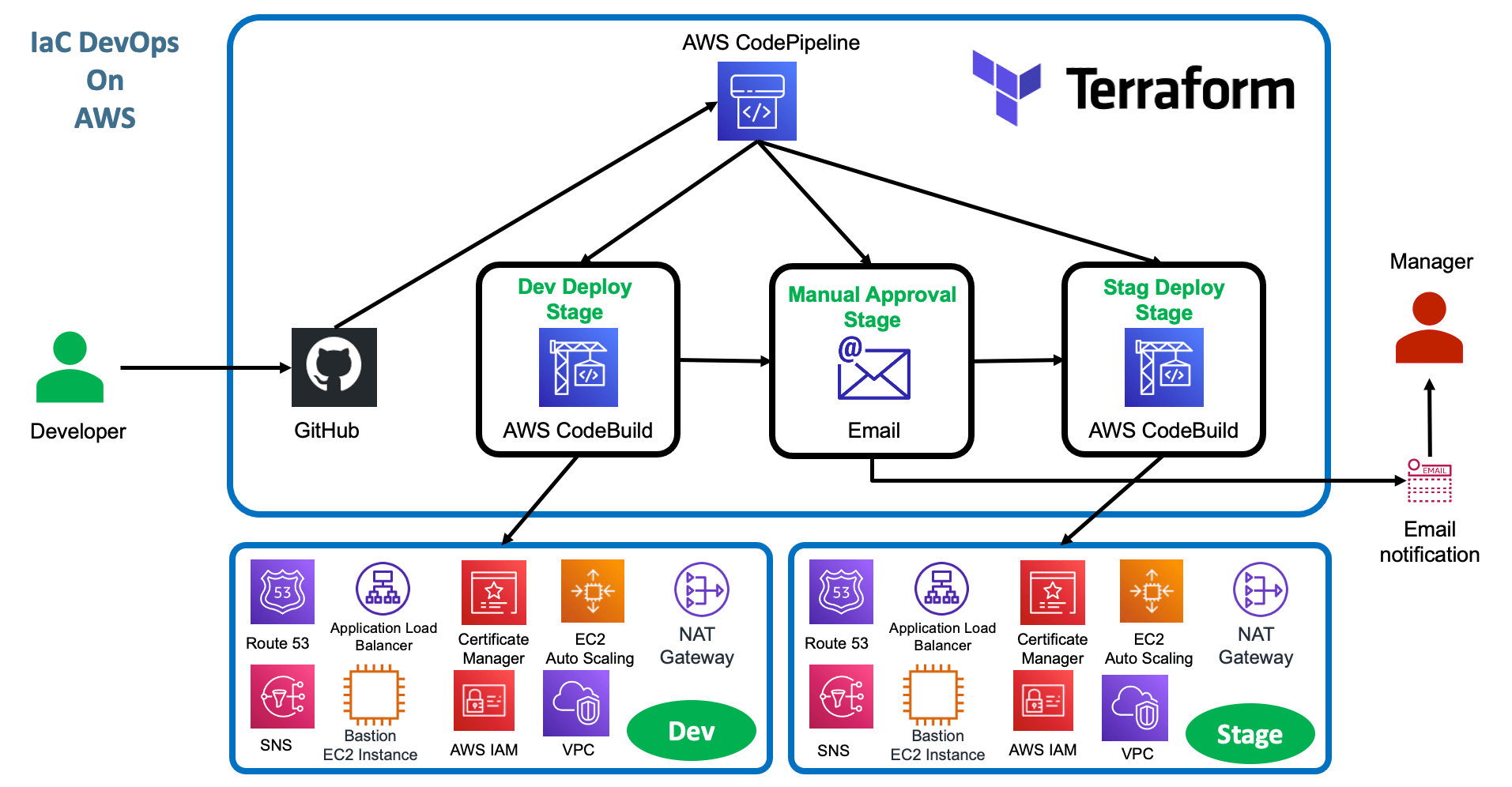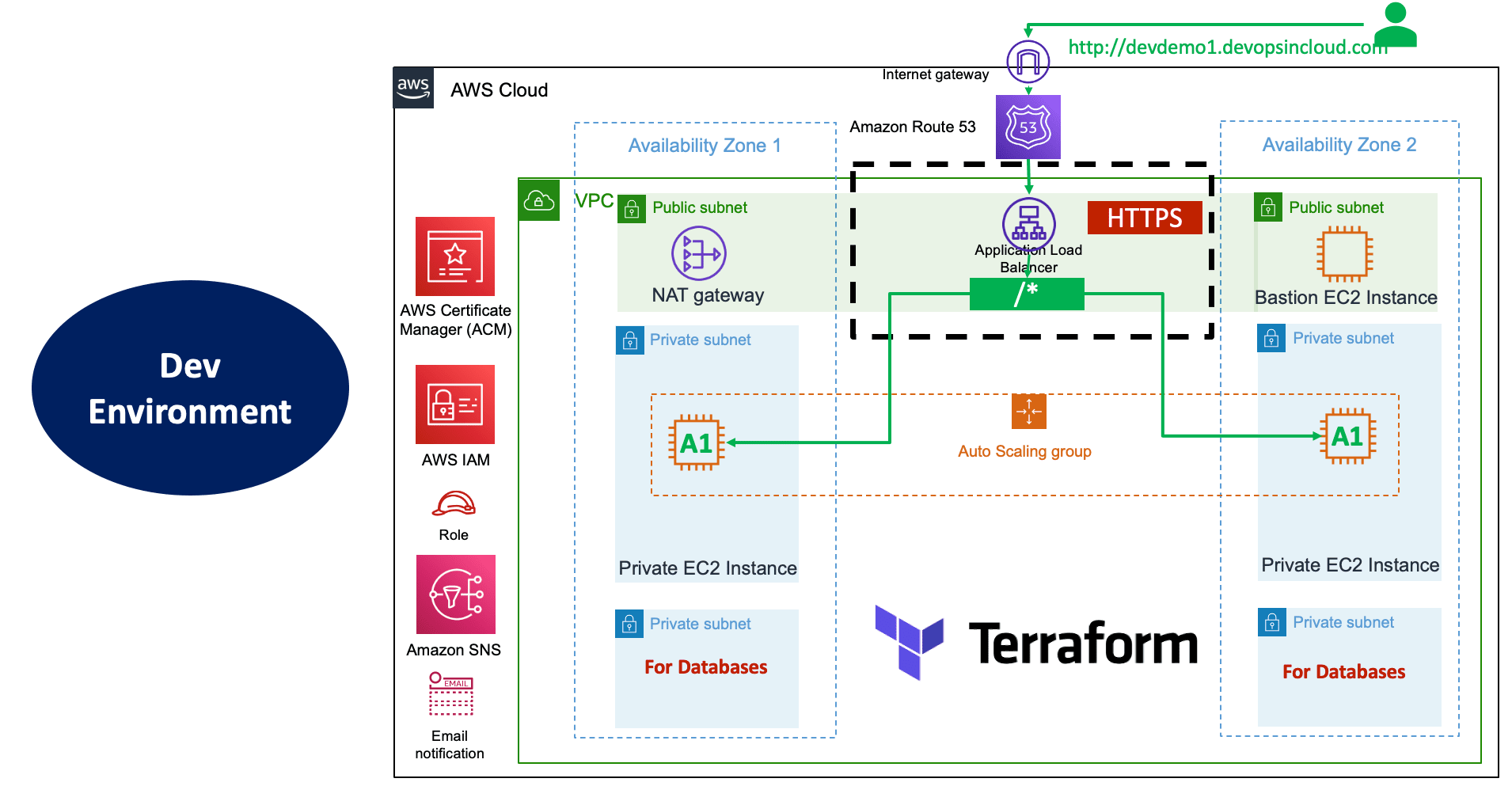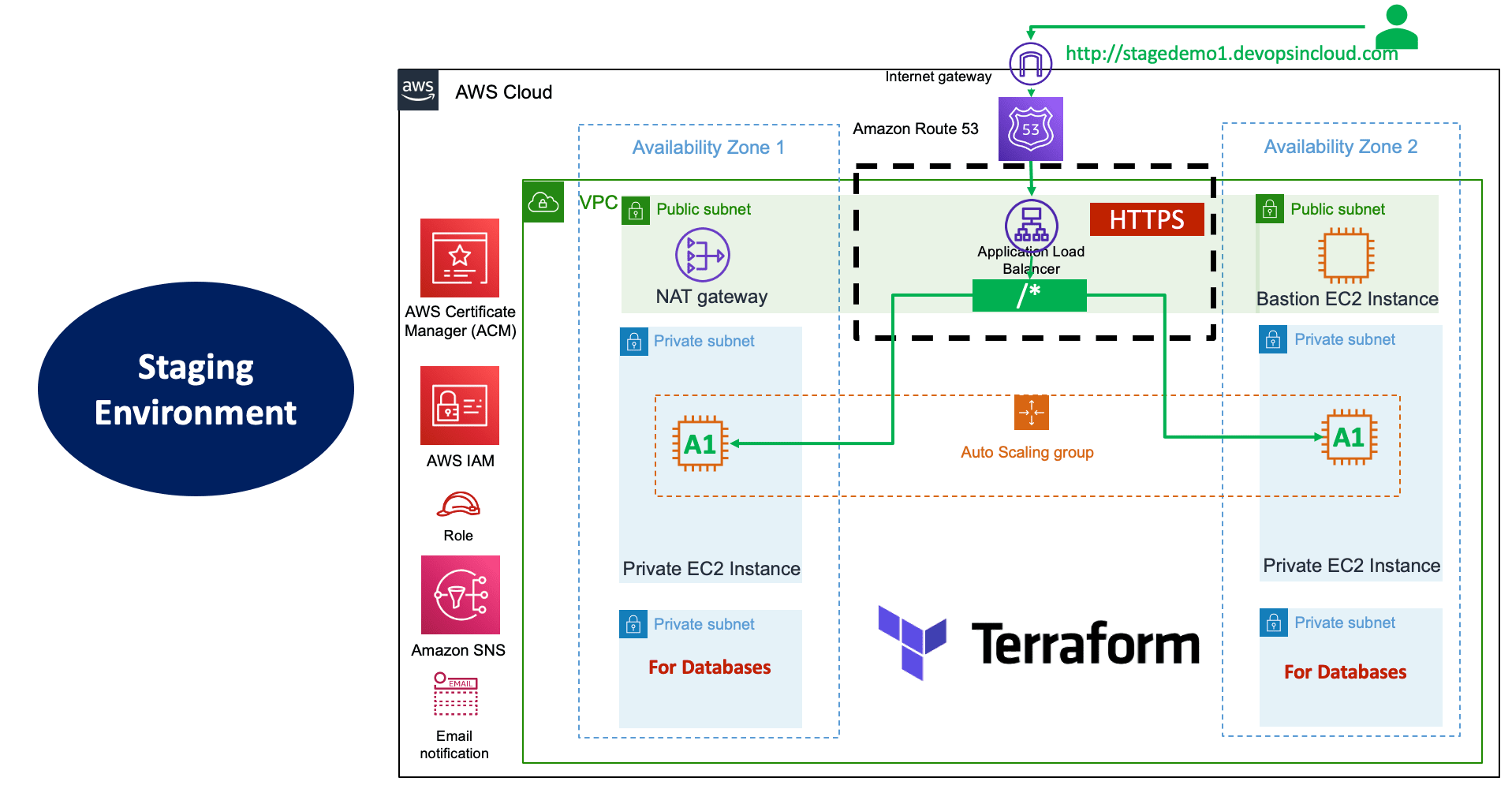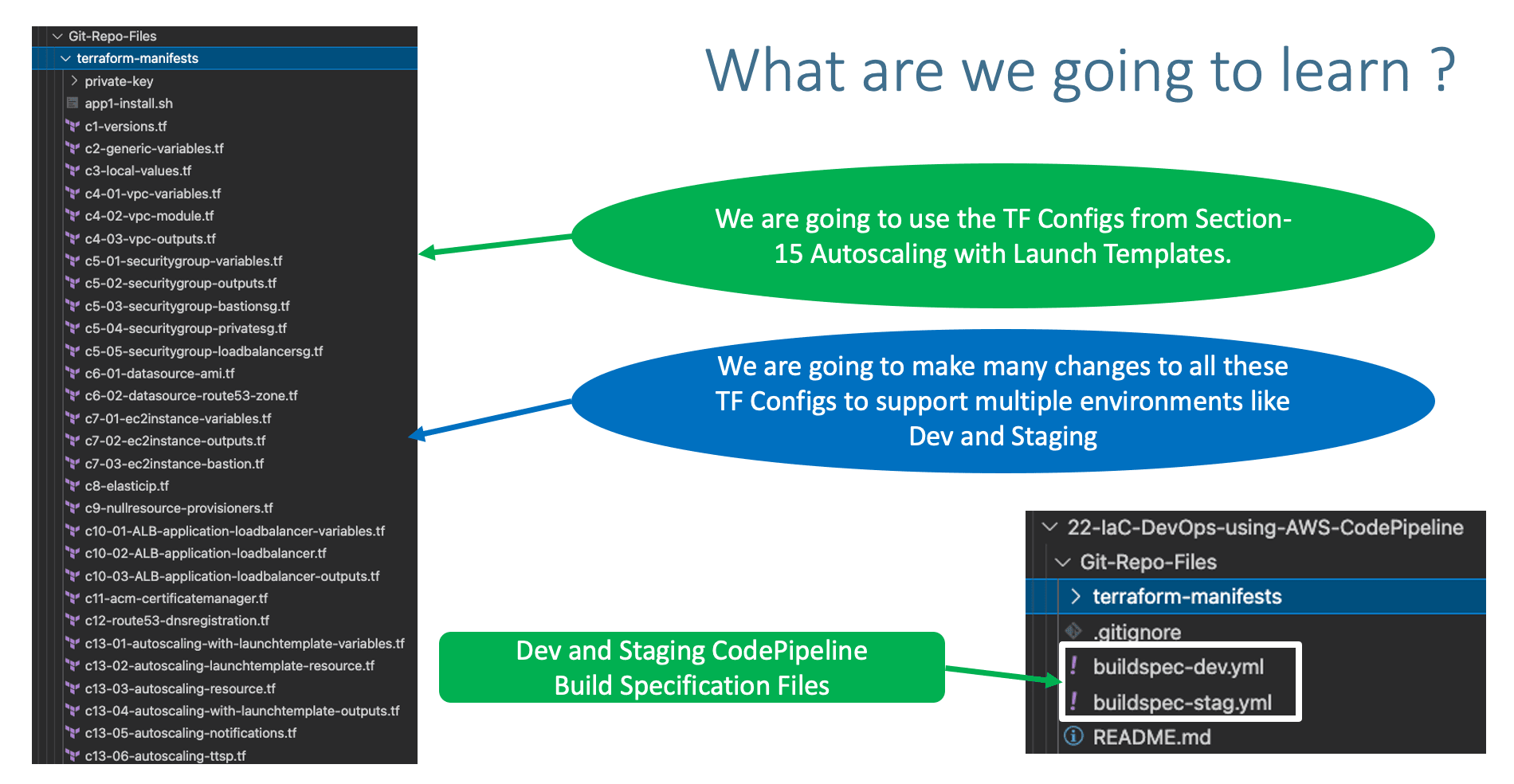| title |
|---|
Terraform IaC DevOps using AWS CodePipeline |
In this repository, you will find CodeBuild scripts that automate the execution of Terraform to deploy infrastructure on AWS. The scripts are configured to work with the development (dev) and staging (stag) environments, making it easier to create and manage resources on the AWS cloud in a reproducible and secure manner.
Configurations for Development (dev) and Staging (stag) environments. Use of Terraform version 0.15.3. Deployment of resources such as VPC, ASG, ALB, Route53, ACM, Security Groups, and SNS. Secure handling of AWS environment variables and credentials. Steps Performed in the CodeBuild Scripts: Terraform Installation:
Pre_build phase:
Build phase:
Initialize Terraform with specific configurations for dev or stag. Validate Terraform configuration files. Plan changes to be made to the infrastructure. Apply changes to the infrastructure according to the specified command (apply or destroy). Post_build phase:
These scripts serve as a practical guide for implementing infrastructure as code on AWS using Terraform, enabling efficient and scalable management of cloud resources.
- Terraform Backend with backend-config
- How to create multiple environments related Pipeline with single TF Config files in Terraform ?
- As part of Multiple environments we are going to create
devandstagenvironments - We are going build IaC DevOps Pipelines using
- AWS CodeBuild
- AWS CodePipeline
- Github
- We are going to streamline the
terraform-manifeststaken fromsection-15and streamline that to support Multiple environments.
- Copy
terraform-manifestsfrom Section-1515-Autoscaling-with-Launch-Templates - Update
private-key\terraform-key.pemwith your private key with same name.
# Adding Backend as S3 for Remote State Storage
backend "s3" { } bucket = "terraform-on-aws-for-ec2"
key = "iacdevops/dev/terraform.tfstate"
region = "us-east-1"
dynamodb_table = "iacdevops-dev-tfstate" bucket = "terraform-on-aws-for-ec2"
key = "iacdevops/stag/terraform.tfstate"
region = "us-east-1"
dynamodb_table = "iacdevops-stag-tfstate" - Go to Services -> S3 -> terraform-on-aws-for-ec2
- Create Folder
iacdevops - Create Folder
iacdevops\dev - Create Folder
iacdevops\stag
- Create Dynamo DB Table for Dev Environment
- Table Name: iacdevops-dev-tfstate
- Partition key (Primary Key): LockID (Type as String)
- Table settings: Use default settings (checked)
- Click on Create
- Create Dynamo DB Table for Staging Environment
- Table Name: iacdevops-stag-tfstate
- Partition key (Primary Key): LockID (Type as String)
- Table settings: Use default settings (checked)
- Click on Create
- We have two options here.
Step-03-01: Option-1: Create separate folders per environment and have same TF Config files (c1 to c13) maintained per environment
- More work as we need to manage many environment related configs
- Dev - C1 to C13 - Approximate 30 files
- QA - C1 to C13 - Approximate 30 files
- Stg - C1 to C13 - Approximate 30 files
- Prd - C1 to C13 - Approximate 30 files
- DR - C1 to C13 - Approximate 30 files
- Close to 150 files you need to manage changes.
- For critical projects which you want to isolate as above, Terraform also recommends this approach but its all case to case basis on the environment we have built, skill level and organization level standards.
Step-03-02: Option-2: Create only 1 folder and leverage same C1 to C13 files (approx 30 files) across environments.
- Only 30 files to manage across Dev, QA, Staging, Production and DR environments.
- We are going to take this
option-2and build the pipeline for Dev and Staging environments
- Merge
vpc.auto.tfvarsandec2instance.auto.tfvarsto environment specific.tfvarsexampledev.tfvarsandstag.tfvats - Also don't provide
.auto.indev.tfvarsorstag.tfvarsif we want to leverage same TF Config files across environmets. - We are going to pass the
.tfvarsfile as-var-fileargument toterraform applycommand
terraform apply -input=false -var-file=dev.tfvars -auto-approve # Environment
environment = "dev"
# VPC Variables
vpc_name = "myvpc"
vpc_cidr_block = "10.0.0.0/16"
vpc_availability_zones = ["us-east-1a", "us-east-1b", "us-east-1c"]
vpc_public_subnets = ["10.0.101.0/24", "10.0.102.0/24", "10.0.103.0/24"]
vpc_private_subnets = ["10.0.1.0/24", "10.0.2.0/24", "10.0.3.0/24"]
vpc_database_subnets= ["10.0.151.0/24", "10.0.152.0/24", "10.0.153.0/24"]
vpc_create_database_subnet_group = true
vpc_create_database_subnet_route_table = true
vpc_enable_nat_gateway = true
vpc_single_nat_gateway = true
# EC2 Instance Variables
instance_type = "t3.micro"
instance_keypair = "terraform-key"
private_instance_count = 2# Environment
environment = "stag"
# VPC Variables
vpc_name = "myvpc"
vpc_cidr_block = "10.0.0.0/16"
vpc_availability_zones = ["us-east-1a", "us-east-1b", "us-east-1c"]
vpc_public_subnets = ["10.0.101.0/24", "10.0.102.0/24", "10.0.103.0/24"]
vpc_private_subnets = ["10.0.1.0/24", "10.0.2.0/24", "10.0.3.0/24"]
vpc_database_subnets= ["10.0.151.0/24", "10.0.152.0/24", "10.0.153.0/24"]
vpc_create_database_subnet_group = true
vpc_create_database_subnet_route_table = true
vpc_enable_nat_gateway = true
vpc_single_nat_gateway = true
# EC2 Instance Variables
instance_type = "t3.micro"
instance_keypair = "terraform-key"
private_instance_count = 2- Remove / Delete the following two files
- vpc.auto.tfvars
- ec2instance.auto.tfvars
terraform.tfvarswhich autoloads for all environment creations will have only generic variables.
# Generic Variables
aws_region = "us-east-1"
business_divsion = "hr"- Remove Local Exec Provisioner which is not applicable in CodePipeline -> CodeBuild case.
## Local Exec Provisioner: local-exec provisioner (Creation-Time Provisioner - Triggered during Create Resource)
provisioner "local-exec" {
command = "echo VPC created on `date` and VPC ID: ${module.vpc.vpc_id} >> creation-time-vpc-id.txt"
working_dir = "local-exec-output-files/"
#on_failure = continue
}- Remove the folder
local-exec-output-files
- Remove Local Exec Provisioner which is not applicable in CodePipeline -> CodeBuild case.
## Local Exec Provisioner: local-exec provisioner (Destroy-Time Provisioner - Triggered during deletion of Resource)
provisioner "local-exec" {
command = "echo Destroy time prov `date` >> destroy-time-prov.txt"
working_dir = "local-exec-output-files/"
when = destroy
#on_failure = continue
} # Before
name = "public-bastion-sg"
# After
name = "${local.name}-public-bastion-sg"# Before
name = "private-sg"
# After
name = "${local-name}-private-sg" # Before
name = "loadbalancer-sg"
# After
name = "${local.name}-loadbalancer-sg" # DNS Name Input Variable
variable "dns_name" {
description = "DNS Name to support multiple environments"
type = string
}# DNS Registration
resource "aws_route53_record" "apps_dns" {
zone_id = data.aws_route53_zone.mydomain.zone_id
name = var.dns_name
type = "A"
alias {
name = module.alb.lb_dns_name
zone_id = module.alb.lb_zone_id
evaluate_target_health = true
}
}# DNS Name
dns_name = "devdemo1.devopsincloud.com"# DNS Name
dns_name = "stagedemo1.devopsincloud.com"- In your case, the domain names will change as per this step.
# Before
subject_alternative_names = [
"*.devopsincloud.com"
]
# After
subject_alternative_names = [
#"*.devopsincloud.com"
var.dns_name
]# Before
name = "my-launch-template"
# After
name_prefix = "${local.name}-"# Before
tag_specifications {
resource_type = "instance"
tags = {
Name = "myasg"
}
}
# After
tag_specifications {
resource_type = "instance"
tags = {
#Name = "myasg"
Name = local.name
}
} # Before
name_prefix = "myasg-"
# After
name_prefix = "${local.name}-" # Before
name = "avg-cpu-policy-greater-than-xx"
name = "alb-target-requests-greater-than-yy"
# After
name = "${local.name}-avg-cpu-policy-greater-than-xx"
name = "${local.name}-alb-target-requests-greater-than-yy" - Go to Services -> Systems Manager -> Application Management -> Parameter Store -> Create Parameter
- Name: /CodeBuild/MY_AWS_ACCESS_KEY_ID
- Descritpion: My AWS Access Key ID for Terraform CodePipeline Project
- Tier: Standard
- Type: Secure String
- Rest all defaults
- Value: ABCXXXXDEFXXXXGHXXX
- Go to Services -> Systems Manager -> Application Management -> Parameter Store -> Create Parameter
- Name: /CodeBuild/MY_AWS_SECRET_ACCESS_KEY
- Descritpion: My AWS Secret Access Key for Terraform CodePipeline Project
- Tier: Standard
- Type: Secure String
- Rest all defaults
- Value: abcdefxjkdklsa55dsjlkdjsakj
- Discuss about following Environment variables we are going to pass
- TERRAFORM_VERSION
- which version of terraform codebuild should use
- As on today
0.15.3is latest we will use that
- TF_COMMAND
- We will use
applyto create resources - We will use
destroyin CodeBuild Environment
- We will use
- AWS_ACCESS_KEY_ID: /CodeBuild/MY_AWS_ACCESS_KEY_ID
- AWS Access Key ID is safely stored in Parameter Store
- AWS_SECRET_ACCESS_KEY: /CodeBuild/MY_AWS_SECRET_ACCESS_KEY
- AWS Secret Access Key is safely stored in Parameter Store
version: 0.2
env:
variables:
TERRAFORM_VERSION: "0.15.3"
TF_COMMAND: "apply"
#TF_COMMAND: "destroy"
parameter-store:
AWS_ACCESS_KEY_ID: "/CodeBuild/MY_AWS_ACCESS_KEY_ID"
AWS_SECRET_ACCESS_KEY: "/CodeBuild/MY_AWS_SECRET_ACCESS_KEY"
phases:
install:
runtime-versions:
python: 3.7
on-failure: ABORT
commands:
- tf_version=$TERRAFORM_VERSION
- wget https://releases.hashicorp.com/terraform/"$TERRAFORM_VERSION"/terraform_"$TERRAFORM_VERSION"_linux_amd64.zip
- unzip terraform_"$TERRAFORM_VERSION"_linux_amd64.zip
- mv terraform /usr/local/bin/
pre_build:
on-failure: ABORT
commands:
- echo terraform execution started on `date`
build:
on-failure: ABORT
commands:
# Project-1: AWS VPC, ASG, ALB, Route53, ACM, Security Groups and SNS
- cd "$CODEBUILD_SRC_DIR/terraform-manifests"
- ls -lrt "$CODEBUILD_SRC_DIR/terraform-manifests"
- terraform --version
- terraform init -input=false --backend-config=dev.conf
- terraform validate
- terraform plan -lock=false -input=false -var-file=dev.tfvars
- terraform $TF_COMMAND -input=false -var-file=dev.tfvars -auto-approve
post_build:
on-failure: CONTINUE
commands:
- echo terraform execution completed on `date` version: 0.2
env:
variables:
TERRAFORM_VERSION: "0.15.3"
TF_COMMAND: "apply"
#TF_COMMAND: "destroy"
parameter-store:
AWS_ACCESS_KEY_ID: "/CodeBuild/MY_AWS_ACCESS_KEY_ID"
AWS_SECRET_ACCESS_KEY: "/CodeBuild/MY_AWS_SECRET_ACCESS_KEY"
phases:
install:
runtime-versions:
python: 3.7
on-failure: ABORT
commands:
- tf_version=$TERRAFORM_VERSION
- wget https://releases.hashicorp.com/terraform/"$TERRAFORM_VERSION"/terraform_"$TERRAFORM_VERSION"_linux_amd64.zip
- unzip terraform_"$TERRAFORM_VERSION"_linux_amd64.zip
- mv terraform /usr/local/bin/
pre_build:
on-failure: ABORT
commands:
- echo terraform execution started on `date`
build:
on-failure: ABORT
commands:
# Project-1: AWS VPC, ASG, ALB, Route53, ACM, Security Groups and SNS
- cd "$CODEBUILD_SRC_DIR/terraform-manifests"
- ls -lrt "$CODEBUILD_SRC_DIR/terraform-manifests"
- terraform --version
- terraform init -input=false --backend-config=stag.conf
- terraform validate
- terraform plan -lock=false -input=false -var-file=stag.tfvars
- terraform $TF_COMMAND -input=false -var-file=stag.tfvars -auto-approve
post_build:
on-failure: CONTINUE
commands:
- echo terraform execution completed on `date`
# Change Directory
cd demo-repos
# Execute Git Clone
git clone https://github.com/gerardodavidlopezcastillo/TF_IaC-DevOpsCodePipeline_Public.git
# Copy all files from Section-22 Git-Repo-Files folder
1. Source Folder Path: 22-IaC-DevOps-using-AWS-CodePipeline/Git-Repo-Files
2. Copy all files from Source Folder to Destination Folder
3. Destination Folder Path: demo-repos/terraform-iacdevops-with-aws-codepipeline
# Verify Git Status
git status
# Git Commit
git commit -am "First Commit"
# Push files to Remote Repository
git push
# Verify same on Remote Repository
https://github.com/gerardodavidlopezcastillo/TF_IaC-DevOpsCodePipeline_Public.git- Go to below url and verify
- URL: https://github.com/settings/installations
- Go to Services -> CodePipeline -> Create Pipeline
- In Developer Tools -> Click on Settings -> Connections -> Create Connection
- Select Provider: Github
- Connection Name: terraform-iacdevops-aws-cp-con1
- Click on Connect to Github
- GitHub Apps: Click on Install new app
- It should redirect to github page
Install AWS Connector for GitHub - Only select repositories: terraform-iacdevops-with-aws-codepipeline
- Click on Install
- Click on Connect
- Verify Connection Status: It should be in Available state
- Go to below url and verify
- URL: https://github.com/settings/installations
- You should see
Install AWS Connector for GitHubapp installed
- Go to Services -> CodePipeline -> Create Pipeline
- Pipeline Name: tf-iacdevops-aws-cp1
- Service role: New Service Role
- rest all defaults
- Artifact store: Default Location
- Encryption Key: Default AWS Managed Key
- Click Next
- Source Provider: Github (Version 2)
- Connection: terraform-iacdevops-aws-cp-con1
- Repository name: terraform-iacdevops-with-aws-codepipeline
- Branch name: main
- Change detection options: leave to defaults as checked
- Output artifact format: leave to defaults as
CodePipeline default
- Build Provider: AWS CodeBuild
- Region: N.Virginia
- Project Name: Click on Create Project
- Project Name: codebuild-tf-iacdevops-aws-cp1
- Description: CodeBuild Project for Dev Stage of IAC DevOps Terraform Demo
- Environment image: Managed Image
- Operating System: Amazon Linux 2
- Runtimes: Standard
- Image: latest available today (aws/codebuild/amazonlinux2-x86_64-standard:3.0)
- Environment Type: Linux
- Service Role: New (leave to defaults including Role Name)
- Build specifications: use a buildspec file
- Buildspec name - optional: buildspec-dev.yml (Ensure that this file is present in root folder of your github repository)
- Rest all leave to defaults
- Click on Continue to CodePipeline
- Project Name: This value should be auto-populated with
codebuild-tf-iacdevops-aws-cp1 - Build Type: Single Build
- Click Next
- Click on Skip Deploy Stage
- Click on Create Pipeline
- Verify Source Stage: Should pass
- Verify Build Stage: should fail with error
- Verify Build Stage logs by clicking on details in pipeline screen
[Container] 2021/05/11 06:24:06 Waiting for agent ping
[Container] 2021/05/11 06:24:09 Waiting for DOWNLOAD_SOURCE
[Container] 2021/05/11 06:24:09 Phase is DOWNLOAD_SOURCE
[Container] 2021/05/11 06:24:09 CODEBUILD_SRC_DIR=/codebuild/output/src851708532/src
[Container] 2021/05/11 06:24:09 YAML location is /codebuild/output/src851708532/src/buildspec-dev.yml
[Container] 2021/05/11 06:24:09 Processing environment variables
[Container] 2021/05/11 06:24:09 Decrypting parameter store environment variables
[Container] 2021/05/11 06:24:09 Phase complete: DOWNLOAD_SOURCE State: FAILED
[Container] 2021/05/11 06:24:09 Phase context status code: Decrypted Variables Error Message: AccessDeniedException: User: arn:aws:sts::180789647333:assumed-role/codebuild-codebuild-tf-iacdevops-aws-cp1-service-role/AWSCodeBuild-97595edc-1db1-4070-97a0-71fa862f0993 is not authorized to perform: ssm:GetParameters on resource: arn:aws:ssm:us-east-1:180789647333:parameter/CodeBuild/MY_AWS_ACCESS_KEY_ID
- Get the IAM Service Role name CodeBuild Project is using
- Go to CodeBuild -> codebuild-tf-iacdevops-aws-cp1 -> Edit -> Environment
- Make a note of Service Role ARN
# CodeBuild Service Role ARN
arn:aws:iam::180789647333:role/service-role/codebuild-codebuild-tf-iacdevops-aws-cp1-service-role- Go to Services -> IAM -> Policies -> Create Policy
- Service: Systems Manager
- Actions: Get Parameters (Under Read)
- Resources: All
- Click Next Tags
- Click Next Review
- Policy name: systems-manger-get-parameter-access
- Policy Description: Read Parameters from Parameter Store in AWS Systems Manager Service
- Click on Create Policy
- Go to Services -> IAM -> Roles -> Search for
codebuild-codebuild-tf-iacdevops-aws-cp1-service-role - Attach the polic named
systems-manger-get-parameter-access
- Go to Services -> CodePipeline -> tf-iacdevops-aws-cp1
- Click on Release Change
- Verify Source Stage:
- Should pass
- Verify Build Stage:
- Verify Build Stage logs by clicking on details in pipeline screen
- Verify
Cloudwatch -> Log Groupslogs too (Logs saved in CloudWatch for additional reference)
- Confirm SNS Subscription in your email
- Verify EC2 Instances
- Verify Launch Templates (High Level)
- Verify Autoscaling Group (High Level)
- Verify Load Balancer
- Verify Load Balancer Target Group - Health Checks
- Access and Test
# Access and Test
http://devdemo1.devopsincloud.com
http://devdemo1.devopsincloud.com/app1/index.html
http://devdemo1.devopsincloud.com/app1/metadata.html- Go to Services -> AWS CodePipeline -> tf-iacdevops-aws-cp1 -> Edit
- Name: Email-Approval
- Action Name: Email-Approval
- Action Provider: Manual Approval
- SNS Topic: Select SNS Topic from drop down
- Comments: Approve to deploy to staging environment
- Go to Services -> AWS CodePipeline -> tf-iacdevops-aws-cp1 -> Edit
- Name: Stage-Deploy
- Action Name: Stage-Deploy
- Region: US East (N.Virginia)
- Action Provider: AWS CodeBuild
- Input Artifacts: Source Artifact
- Project Name: Click on Create Project
- Project Name: stage-deploy-tf-iacdevops-aws-cp1
- Description: CodeBuild Project for Staging Environment of IAC DevOps Terraform Demo
- Environment image: Managed Image
- Operating System: Amazon Linux 2
- Runtimes: Standard
- Image: latest available today (aws/codebuild/amazonlinux2-x86_64-standard:3.0)
- Environment Type: Linux
- Service Role: New (leave to defaults including Role Name)
- Build specifications: use a buildspec file
- Buildspec name - optional: buildspec-stag.yml (Ensure that this file is present in root folder of your github repository)
- Rest all leave to defaults
- Click on Continue to CodePipeline
- Project Name: This value should be auto-populated with
stage-deploy-tf-iacdevops-aws-cp1 - Build Type: Single Build
- Click on Done
- Click on Save
- Update the IAM Role created as part of this
stage-deploy-tf-iacdevops-aws-cp1CodeBuild project by adding the policysystems-manger-get-parameter-access1
- Go to Services -> AWS CodePipeline -> tf-iacdevops-aws-cp1
- Click on Release Change
- Verify Source Stage
- Verify Build Stage (Dev Environment - Dev Depploy phase)
- Verify Manual Approval Stage - Approve the change
- Verify Stage Deploy Stage
- Verify build logs
- Confirm SNS Subscription in your email
- Verify EC2 Instances
- Verify Launch Templates (High Level)
- Verify Autoscaling Group (High Level)
- Verify Load Balancer
- Verify Load Balancer Target Group - Health Checks
- Access and Test
# Access and Test
http://stagedemo1.devopsincloud.com
http://stagedemo1.devopsincloud.com/app1/index.html
http://stagedemo1.devopsincloud.com/app1/metadata.html- Increase minimum EC2 Instances from 2 to 3
# Before
desired_capacity = 2
max_size = 10
min_size = 2
# After
desired_capacity = 4
max_size = 10
min_size = 4# Verify Changes
git status
# Commit Changes to Local Repository
git add .
git commit -am "ASG Min Size from 2 to 4"
# Push changes to Remote Repository
git push- Go to Services -> CodePipeline -> tf-iacdevops-aws-cp1
- Verify Dev Deploy Logs
- Approve at
Manual Approvalstage - Verify Stage Deploy Logs
- Go to Services -> EC2 Instances
- Newly created instances should be visible.
- hr-dev: 4 EC2 Instances
- hr-stag: 4 EC2 Instances
# Before
TF_COMMAND: "apply"
#TF_COMMAND: "destroy"
# After
#TF_COMMAND: "apply"
TF_COMMAND: "destroy" # Before
TF_COMMAND: "apply"
#TF_COMMAND: "destroy"
# After
#TF_COMMAND: "apply"
TF_COMMAND: "destroy" # Verify Changes
git status
# Commit Changes to Local Repository
git add .
git commit -am "Destroy Resources"
# Push changes to Remote Repository
git push- Go to Services -> CodePipeline -> tf-iacdevops-aws-cp1
- Verify Dev Deploy Logs
- Approve at
Manual Approvalstage - Verify Stage Deploy Logs
- Change them back to original state
# Before
desired_capacity = 4
max_size = 10
min_size = 4
# After
desired_capacity = 2
max_size = 10
min_size = 2- Change them back to original state
# Before
#TF_COMMAND: "apply"
TF_COMMAND: "destroy"
# After
TF_COMMAND: "apply"
#TF_COMMAND: "destroy" # Verify Changes
git status
# Commit Changes to Local Repository
git add .
git commit -am "Fixed all the changes back to demo state"
# Push changes to Remote Repository
git push


